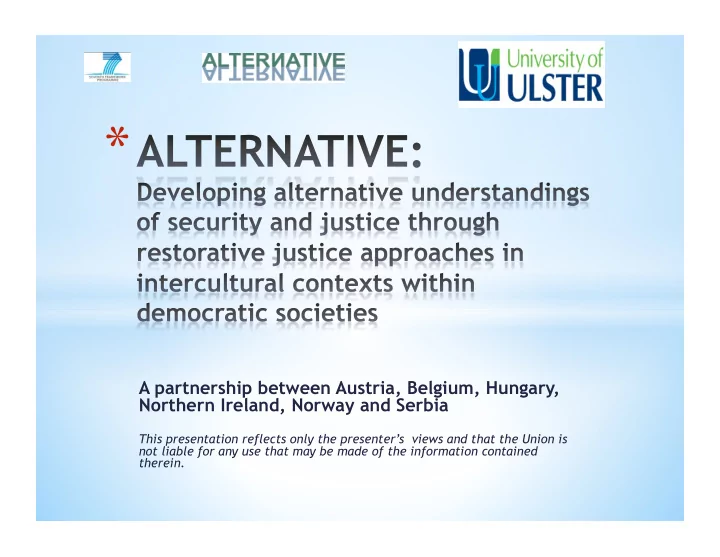

A partnership between Austria, Belgium, Hungary, Northern Ireland, Norway and Serbia This presentation reflects only the presenter’s views and that the Union is not liable for any use that may be made of the information contained therein.
* 30 years of violent conflict relating to the legitimacy of the state, struggles within the criminal justice system and discrimination and inequality. * Strong civil society and community based restorative justice. * Peace process – democratisation of government, human rights equality and reform of criminal justice. * Colonisation of civil society?
* Contribute through researching of RJ concepts and practices in assisting Northern Ireland to move from being a conflicted society to an agreed society after many years of violent civil conflict. * To provide alternative understandings of conflict and its resolution and to develop and design appropriate RJ strategies and interventions that strengthen social inclusion, active citizenship and social cohesion in a variety of social contexts. * To evaluate the effectiveness of training community activists and ex-combatants in RJ and non-violent methods of resolving conflict. * Conducting an action research programme focusing on restorative responses in three sites in order to adequately address inter-community, intergenerational, and ethnic conflicts.
* South Belfast – CARE * West Belfast – CRJI * Derry/Londonderry – Northlands
* Ex-combatants have undertaken training in restorative justice and are playing a key role in addressing harm and conflict in their communities. * Community based restorative justice can prevent conflict in intercultural settings – South Belfast. And resolve race hate crime and conflicts when they occur – East Belfast. * Communities can be activated through community conferences to address serious issues – Derry/ Londonderry
* CRJI has transformed its relationship with the police and other state agencies and is providing a high quality service to local communities and increasingly across communties. * Even when state agencies are genuinely committed to restorative justice and to community involvement they are reluctant to relinquish their power over justice preferring to engage community organisations in community safety and rehabilitation.
Arnstein’s ladder of active participation Citizen power: • Citizen control Delegated power • Partnership • Tokenism: Placation • • Consultation Informing • Non-participation: Therapy • Manipulation •
* Justice and security * Communicative action and strategic action * Community and identity * Restorative justice * Community education, mediation and circles
Thank you
* Concepts paper – Community, Identity, Religion and Violence * Literature review – current theory and practice of conflict resolution in Northern Ireland * A research report on the contribution of restorative justice concepts and practices in the context of harmful conflict in intercultural settings * Site selection and bursaries agreements including offering accredited training to community activists. Key focus – capacity building * A baseline research report into issues and needs in three sites where the community is experiencing conflict.
* A paper on the societal ecology of restorative justice in Northern Ireland * A practice manual for appropriate restorative justice responses to inter group conflict tailored to the research sites * Design of an action research methodology which enables comparative analysis * The filming of the research programme and two books * Dissemination at the EFRJ International Conference Belfast June 2014 * Towards a report on the research into the process and outcomes of the restorative responses on each of the three sites. * Closing conference in Leuven, Belgium, in November 2015.
Recommend
More recommend